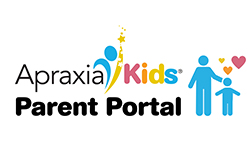For Early Language Users
- Sit in on therapy sessions as often as possible. Some kids perform better when the parent is not in the room; you can allow your child individual time with the speech-language pathologist (SLP), but join them for the last 10 minutes so that you can see what the therapist is doing.
- Plan to use some of your child’s therapy sessions as a coaching session for you. Therapy is most effective when it involves everybody in the child’s life. Ask the SLP if you can sit on the floor and learn to coach your child on saying the words correctly.
- Help your SLP pick functional/power words that will be worked on in therapy. Keep in mind that ‘functional’ is subjective and should be determined from your child’s perspective. What does your child want to say?
- Remember that you are the expert on your child. Tell your SLP what your child likes to play with, what motivates your child (stickers don’t work for all!), what frustrated moments look like, how you help your child calm down, and anything else that you think would be helpful to know.
- Keep a list of the sounds and words your child says.
- Keep a list of the sounds and words that are hard for your child.
- Be your child’s cheerleader. Always encourage your child to TRY.
- Also recognize that speech is hard for children with CAS and some days will be more difficult than others despite their best efforts. Acknowledge how hard the child is working. Adjust your expectations and the level of support you provide according to the child’s difficulty level on that day.
- Get the whole family involved in the therapy process. Teach them what you learn in therapy. Retrain everybody to push for more than a grunt or point but also to accept the best the child can do at a given time. You can even send a family member to a therapy session with your child so that they can see what happens and ask the SLP their questions.
- Educate your child’s teachers/day care providers on apraxia and how to assist your child in communicating. Apraxia Kids has materials to help you do this.
- Work on getting your child “ready” for motor speech therapy.
- Play games that require your child to watch your face/mouth.
- Play “copycat” games with big and little body movements (jumping, kicking, tapping a finger, clapping, etc.).
- Be supportive of an alternative form of communication. Ask for one if your therapist has not provided one.
- Sign language/gestures
- Pictures
- Voice output (app on a tablet)
- If you are worried about progress or what is happening during therapy, talk to your SLP. Keep open and honest communication with your SLP.
- Ask your therapist for homework that you do during your everyday routines (bath time, meal time, book reading, etc.).
- Make sure that everybody on your child’s team is collaborating. Your child might have a school SLP, private/hospital SLP, occupational therapist, behavior therapist, or other specialists, depending on what other areas your child might need support in. You are all one team.
By Aubrie Hagopian, M.A., CCC-SLP
January, 2022
